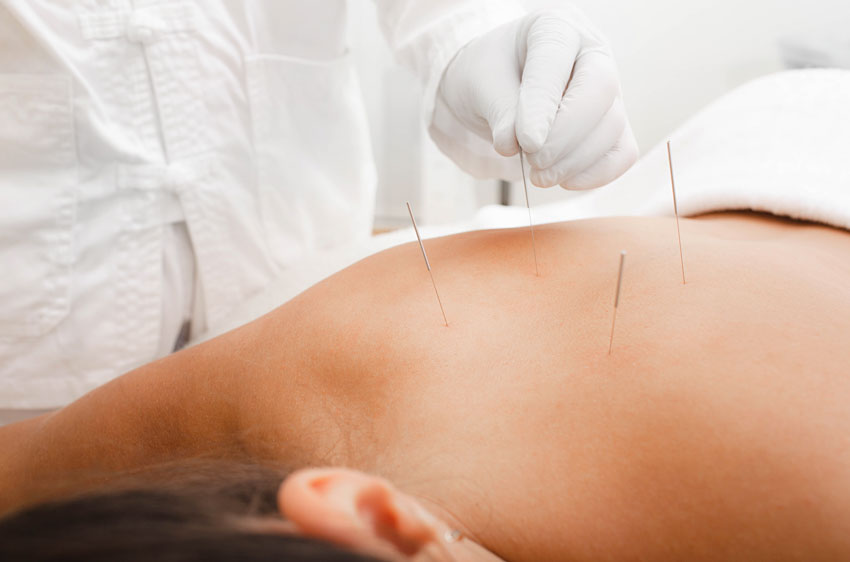
Acupuncture is effective for alleviating depression. Researchers investigated the efficacy of adding acupuncture to standard drug therapy protocols. The results show increased response to treatment with lower levels of depression and overall symptoms.
Acupuncture at back shu points has been found effective for treating patients with depression of yang deficiency type. Researchers from Quanzhou Hospital of Traditional Chinese Medicine and Quanzhou Third City Hospital conducted a clinical experiment comparing the efficacy of treating yang deficiency depression. One group received SSRI medication monotherapy and another group received SSRI medication plus acupuncture. The integrative protocol of combined acupuncture plus medication yielded better patient outcomes. [1]
Observational parameters in this study were the Hamilton Depression Scale (HAMD) score, Rating Scale for Side Effects (SERS), and electroencephalogram (EEG). The HAMD, used to quantify patient severity of depression, includes sleep difficulties, weight gain, sense of guilt, depressed mood, suicide ideation, insomnia, work and activities, agitation, psychic and somatic anxiety, gastrointestinal somatic symptoms, genital symptoms, hypochondriasis and other items.
Each item was rated on a 5-point scale and summed to obtain a total score. Higher scores indicate higher severity of depression. The SERS used in this study included 14 items such as somatic fatigue, headaches, palpitations, tremors, sleep disorders, dizziness, sweating, dry mouth, erectile dysfunction, constipation, urinary disorders and drowsiness. Each item was rated on a 3-point scale. Higher scorers indicate worse side effects. EEG was examined and assessed one day prior to and after administering treatment. Abnormalities were presented by alpha wave slowing, alpha wave generalization, poorly modulated alpha wave, increased theta wave, and generalized fast wave.
Before the treatment, HAMD scores of both groups were similar at approximately 25 points. However, once the treatment was completed, the figure in the integral group (12) was lower than that of the control group (15). SERS scores dropped significantly in both two groups, with more obvious decline shown in the integral group. Fewer patients presented abnormal brain waves in the integral treatment group compared to the monotherapy group (6 versus 10). The HAMD, SERS and EEG all show that the integrative treatment model produces optimal patient outcomes.
The researchers used a sample of 80 patients admitted to the hospitals from June 2019 to September 2020. Patients’ statistical baseline was the same prior to the experiment. Age range of all patients was 18 to 60 years. Mini-mental State Examination (MMSE) score was above 12 points. All patients met the criteria for moderate depression based on the ICD-10 Classification of Mental and Behavioral Disorders. Patients’ Hamilton Depression Scale (HAMD) score exceeded 18 points.
The drug monotherapy group received only escitalopram for a six-week period. This selective serotonin reuptake inhibitor (SSRI) is known commonly by the brand name Lexapro. For both groups, 10 mg escitalopram was administered to patients after breakfast on a daily basis for a total of six weeks.
For the integral therapy group, in addition to the identical escitalopram regimen, warm needle acupuncture was administered using 0.30 mm × 40mm needles and 1.8 cm × 2.7 cm moxa. The points chosen were bilateral back shu points:
- BL15 (Xinshu)
- BL18 (Ganshu)
- BL20 (Pishu)
- BL13 (Feishu)
- BL23 (Shenshu)
Needles were obliquely inserted toward the spine after being sterilized. Upon achieving deqi, two moxa pieces were used at each point. Needle retention time was 30 minutes. The above treatment was performed five times a week.
Researchers note that back shu points chosen along the Taiyang Bladder Meridian of the foot are closely related to emotions and mental health. Applying acupuncture at these points strengthens yang and nourishes zang organs, thus achieving the effect of mitigating depression.
Reference:
[1] Lin Yiru, Wang Jinyi, Ji Yaru, Lin Zihan, Curative Effects of the Combined Therapy of Warm Acupuncture at Back Shu Points of Liver and Bio-medicine on Depression of Yang Deficiency Type and Its Attenuating Effects, Acupuncture Research, November 2021, Volume 26, Issue 11.


